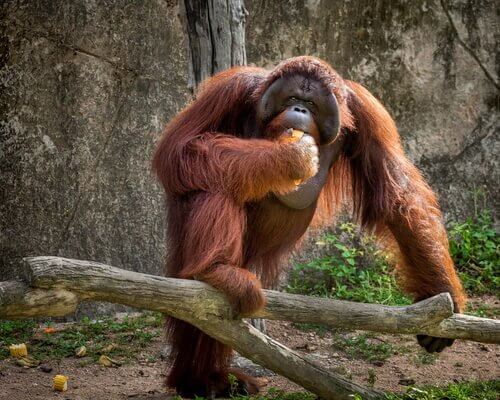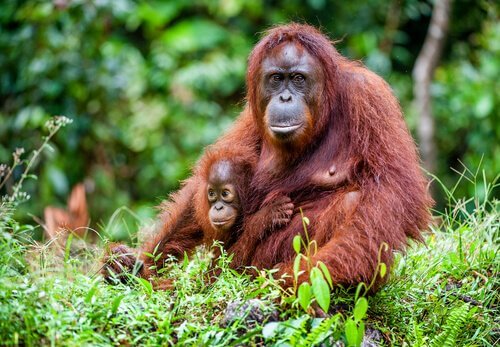Smart Animals: Amazing Orangutans Re-invent the Hook!

We all know that primates are one of the most intelligent species on earth. However, when you read about some recent tests on orangutans, you’ll really be amazed! These amazing orangutans have managed to leave us speechless with their incredible ability to make hooks.
Scientists have discovered a practice that has never been seen before in any species apart from humans. Orangutans have shown that they’re one step ahead of other primates. Learn about a successful experiment in which they’ve shown their imagination and skills.
Results from the amazing orangutan experiment
Specialists carried out the study at the Universities of Vienna and Saint Andrews. It showed how apes are able to use different wires to gain access to places where their fingers cannot reach.
During the first trial, the orangutan was able to make a hook out of a straight wire. The goal was to get a reward placed in a basket inside a tube, and he managed to make a hook with his teeth while keeping the wire straight.
For the second trial, scientists used a bent wire. At first, the wire wasn’t long enough to reach the prize placed inside a straight tube. In order to reach their goal, several orangutans managed to straighten the wire in a matter of minutes. Once the wire was long enough, they reached and pushed the target out of the tube without any trouble. Scientists claim they’ve never seen anything like it before.

Incredible results
In order to understand the importance of these discoveries and to compare the intelligence of these primates with that of humans, children of different ages took part in similar tests. The results were more than just surprising.
From the age of five, a human being is capable of using complex tools to achieve goals. However, when the experts gave the kids the challenge of rescuing a basket from the bottom of a pipe using only a straight wire, it became quite complicated for them.
Most children between the ages of three and five weren’t able to do it. Only very few of them came up with the idea of bending the wire to make a hook. Even a high number of seven-year-olds failed the test. As a result, this gives us an idea of the orangutans’ level of problem-solving and intelligence.
The tests were only successful with children over 8 years old. What attracted the scientists’ attention was that children, regardless of their age, had greater success when previously shown how to use the wire. However, the youngest ones didn’t succeed, despite having understood how to use the hook.
Isabelle Laumer was the person in charge of carrying out the experiment at the Leipzig Zoo, in Germany. She claimed that the study has shown that the amazing orangutans have the ability to make and use tools.
Laumer also stated that orangutans have a far superior ability to what they believed. According to this study, they’re capable of outdoing humans under eight years old.

The future of the species
Experts consider these amazing orangutans as seriously endangered in the wild. There are only 104,700 specimens left of the Bornean Orangutan, while the Sumatran orangutan barely reaches a population of 14,600.
The tropical hardwood forests where they live are disappearing more and more. This is because of wood and mineral extraction, and also the conversion of the forests into crop fields. Currently, only 50% of orangutans live in the wild.
On the other hand, illegal baby orangutan markets are also affecting their population. Dealers kill the mother, and the babies suffer a journey which very few survive. Their purpose is to sell them as pets in different parts of the world.
Until much stronger measures are taken against this, their numbers won’t stop declining. As a result, and as it has already happened with many others, we will lose an irreplaceable animal species.
This text is provided for informational purposes only and does not replace consultation with a professional. If in doubt, consult your specialist.